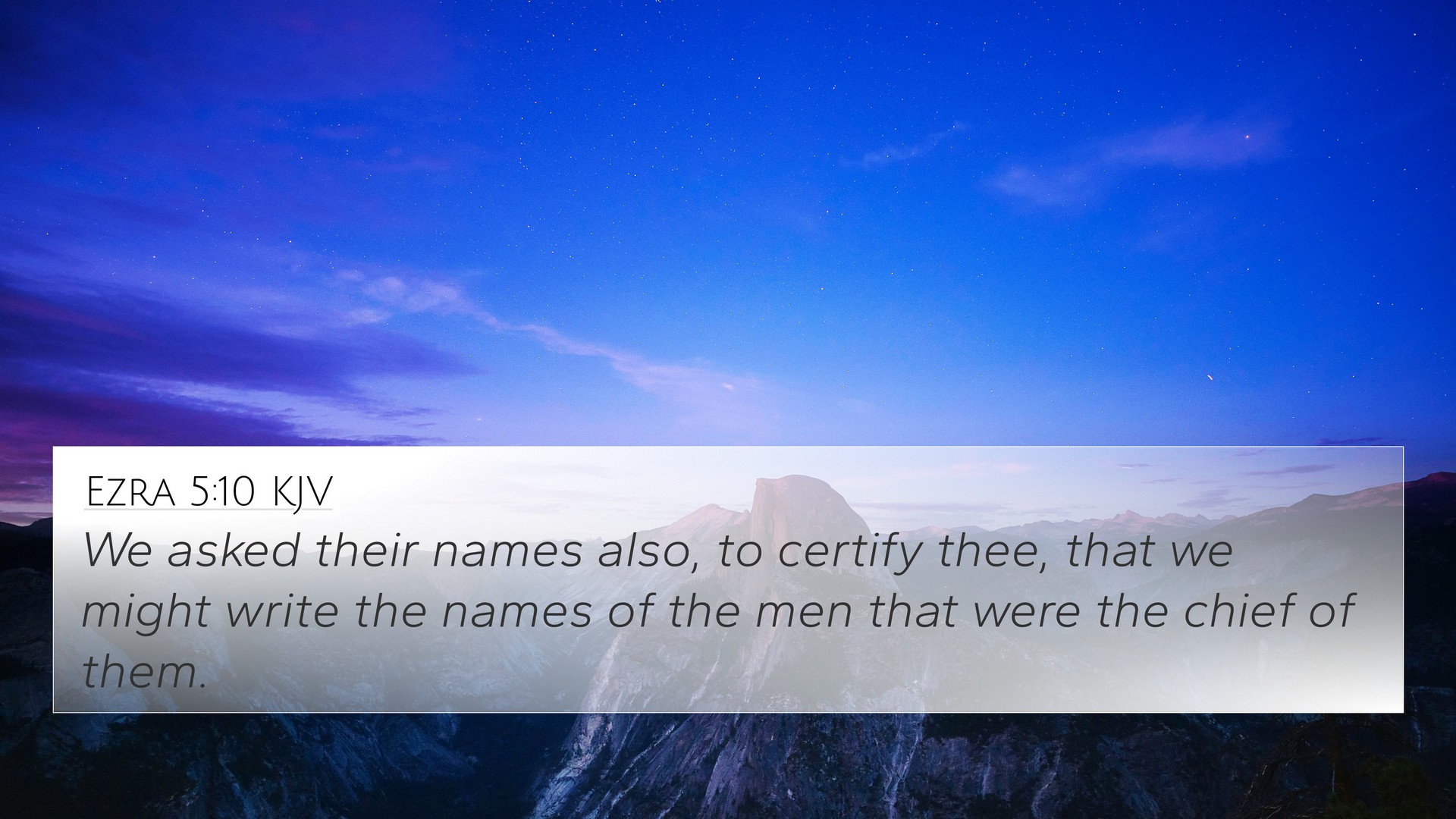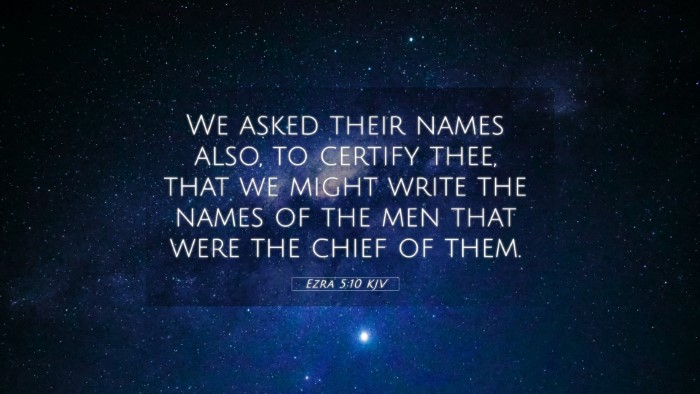Old Testament
Genesis Exodus Leviticus Numbers Deuteronomy Joshua Judges Ruth 1 Samuel 2 Samuel 1 Kings 2 Kings 1 Chronicles 2 Chronicles Ezra Nehemiah Esther Job Psalms Proverbs Ecclesiastes Song of Solomon Isaiah Jeremiah Lamentations Ezekiel Daniel Hosea Joel Amos Obadiah Jonah Micah Nahum Habakkuk Zephaniah Haggai Zechariah MalachiEzra 5:10 Similar Verses
Ezra 5:10 Cross References
We asked their names also, to certify thee, that we might write the names of the men that were the chief of them.
Uncover the Rich Themes and Topics of This Bible Verse
Listed below are the Bible themes associated with Ezra 5:10. We invite you to explore each theme to gain deeper insights into the Scriptures.
Ezra 5:10 Cross Reference Verses
No cross reference images were found in our system for this Bible passage.
Ezra 5:10 Verse Analysis and Similar Verses
Understanding Ezra 5:10
Ezra 5:10 reads: "We asked their names to inform you, that we might write the names of the men who are at the head of this matter."
This verse occurs within a narrative context where the Israelites have begun the rebuilding of the temple after their return from exile. The leaders of the new community are questioned by authorities about their actions. Below is a combined interpretation from recognized public domain commentaries.
Verse Analysis and Interpretation
This verse highlights a critical moment of accountability and transparency. The Jewish leaders are careful to obtain the names of those leading the rebuilding effort so that they might accurately report to the governing officials.
Accountability and Governance
As noted by Matthew Henry, this action underscores the principles of governance and proper administration in the rebuilding efforts. The Jewish leaders demonstrate due diligence by documenting the names of the individuals involved, thereby promoting a sense of order amidst potential opposition.
The Importance of Documentation
Albert Barnes emphasizes the significance of documentation in leadership. By asking for names, the leaders are ensuring that the work is carried out by recognized individuals. This step may serve to prevent misunderstandings and secure the legitimacy of their actions in the eyes of their authorities. It correlates well with themes of leadership throughout the scriptures.
Cooperation with Authorities
Adam Clarke points out that the query signifies a cooperative relationship with the ruling powers of the time. The willingness to provide names is indicative of a respectful approach to authority, reinforcing the notion that the Jewish leaders were not acting in rebellion but were working within the established framework of governance.
The Role of Prayer and Guidance
Before taking actions like these, prayer and divine guidance are essential. This verse can be cross-referenced with James 1:5, which encourages seeking wisdom from God. The Israelites are not just organizing a building project; they are crucially aware of their reliance on divine oversight in their endeavors.
Thematic Connections
This verse can be viewed as a bridge to many Biblical themes including leadership accountability and divine guidance in governance. Ezra's actions foreshadow future integrations between civil authority and spiritual oversight.
Cross References
- Nehemiah 2:5: Nehemiah's appeal to the king demonstrates similar themes of authority and leadership.
- 1 Peter 2:13-14: Encourages submission to governing authorities, resonating with Ezra 5:10.
- Proverbs 11:14: Highlights the necessity of counsel in governance and decision-making.
- Acts 15:22: The early church's delegation reflects similar organization and communication with authorities.
- Romans 13:1: A reminder that all authority is instituted by God, echoing the need for respectful engagement with governance.
- 1 Chronicles 12:32: Men of understanding led Israel, parallel to the responsible leadership called for in Ezra.
- Matthew 18:15: Highlights the need for accountability among brothers, relating to documenting names for transparency.
Theological Reflections
Ezra 5:10 invites readers to reflect on the broader implications of their duties as leaders or followers in faith communities. It prompts us to consider how accountability, respect for authority, and organizational integrity manifest in our faith journeys.
Practical Applications
In modern contexts, believers are encouraged to employ tools for cross-referencing in their studies, such as understanding connections between Bible verses and recognizing the significance of leadership roles in undertaking projects for God. This could involve utilizing a bible concordance or a bible cross-reference guide to deepen their understanding of God's Word.
Conclusion
In conclusion, Ezra 5:10 stands as a significant reminder of the importance of structure, accountability, and cooperation in the work of God. By exploring its meanings through cross-references, we can manifest a richer understanding of the interwoven tapestry that forms the narrative of scripture.
Keywords
- Bible verse cross-references
- Connections between Bible verses
- Cross-referencing Biblical texts
- Comparative Bible verse analysis
- Bible reference resources
- How to use Bible cross-references


